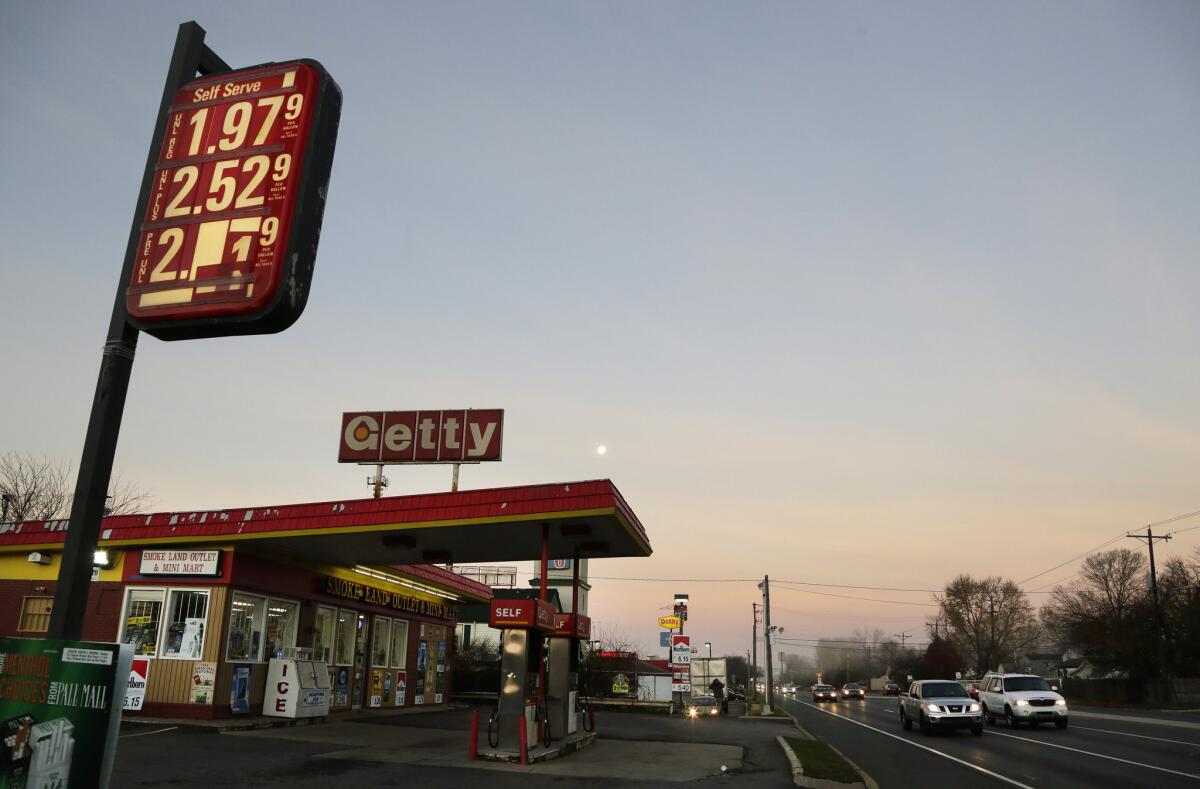Average U.S. gasoline price falls below $2 for first time since 2009, but not so for L.A. area

The price of unleaded regular gas was $1.97 at a gas station in Newark, Del., last month.
The nationwide average for a gallon of regular gasoline fell below $2 on Monday for the first time since March 2009 — but L.A. prices are nowhere near that milestone and probably are as low as they are going to get.
While motorists nationwide are enjoying gas at $1.99, the L.A. average climbed to $2.87 and could continue rising as delays plague repairs at Exxon Mobil’s Torrance plant, which has been operating at less than 20% capacity since a February explosion. The statewide average was $2.72.
The plant was expected to return to full service by mid-February. But now the latest projections are that repairs will not be completed until as late as April 1.
In addition, Tesoro’s Carson refinery and Chevron’s El Segundo site reported unplanned outages, as well as maintenance downtime, within the last month. Compounding the problem is an unplanned outage at Chevron’s Richmond plant in Northern California and a storm-damaged Tesoro plant in Anacortes, Wash.
Gordon Schremp, a senior fuels analyst for the California Energy Commission, said in all, about 30% of the state’s refining capacity is offline.
“In a phrase,” Schremp said, “chronic refinery problems continue, unfortunately.”
So Southern California motorists who want $1.99 gas will simply have to look elsewhere, most likely in another state.
“We may have seen the bottom already for gas prices in California,” said Jeffrey Spring, a spokesman for AAA.
The average local gas price hit a bottom of $2.74 a gallon early this month, the lowest since prices started to rise in Los Angeles this summer.
The state refinery problems have been so severe that they delayed a decline in the national average to below $2 a gallon, Spring said.
Still, the decline of the national average gives consumers a lift for the holidays, coming just when travelers are hitting the road. The nation’s average price has hovered around the $2 mark for about a week, and the average price is below that mark in about 29 states.
“Seeing that $1, it definitely is a psychological thing,” said Allison Mac, a petroleum analyst at GasBuddy.com. “A lot of states have been seeing it. On the national front, it’s pretty huge.”
Marshall Doney, AAA’s president and chief executive, said “the lowest gas prices in nearly seven years are a holiday gift that few consumers could have imagined when gasoline was $4 a gallon.”
AAA said gas prices have dropped because there is more than enough oil and gasoline supply around the world to meet demand.
Brent crude, for instance, fell 70 cents Monday to $36.19, Schremp said. “That’s not barely below $40. That’s quite low,” he noted.
In addition, gas prices generally fall through early winter because people drive less and use less fuel this time of year.
However, the average price in California typically runs higher because of the unique blend of environmentally friendly gas, as well as state taxes and fees. And the difference can get more extreme when refineries switch from the winter blend to the more expensive summer blend in February.
This year, the gap was unusually wide, with the state average as much as 75 cents a gallon more than the national average. In the Los Angeles area, the gap was even greater — as much as $1.50 higher.
Blame for much of the wider disparity fell on the outage at Exxon Mobil’s Torrance plant, which had its pollution-control system damaged in the explosion.
Bob van der Valk, an oil industry analyst, said Exxon Mobil isn’t expecting to bring the Torrance facility back to full service until April 1.
Sam Atwood, a spokesman for the South Coast Air Quality Management District, confirmed Monday that Exxon Mobil had informed the regulator in September that it would take six months to get the plant back to full operation, which would mean sometime in March or early April.
Todd Spitler, an Exxon Mobil spokesman, said the company would not comment on “third party” speculation.
“We continue to work cooperatively with all agencies on a restart plan, but will not speculate on a timeline,” Spitler said.
The repairs must be completed before Exxon can sell the plant to PBF Energy of Parsippany, N.J., in a deal announced in September.
Meanwhile, Tesoro’s Carson plant and Chevron’s El Segundo plant experienced failures with equipment that help process crude oil into gasoline.
Jamie Court, president of advocacy group Consumer Watchdog, criticized state leaders for allowing the troubles with refineries — Torrance in particular — to fester.
“It’s outrageous,” Court said. “When the oil refinery can’t get back up and running after a year, something’s wrong.”
At a hearing before an energy commission panel last week, Court estimated that the higher prices have cost California consumers $10 billion, or $400 per motorist, this year.
During the hearing, Court claimed the wide gap was the result of price manipulation by refiners, resulting in exorbitant profits.
In particular, he accused the refiners of secretly selling gas at lower prices to unbranded stations than to branded stations, which make up about 80% of the market.
“We have crude cheaper than it’s been in my lifetime,” Court said. “Our gas prices are stuck at this $3-plus market.”
GasBuddy.com notes that patient motorists can find prices as low as $2.35 at locations such as Costco in Signal Hill or Sam’s Club and Oasis in Long Beach.
At a 76 gas station on State and Marengo streets near Los Angeles County-USC Medical Center, where regular gasoline was $2.99 a gallon, some drivers were resigned to the higher prices.
Michael Collins, 65, said he drives about 55 miles each day from his home in Rialto to his job as an electrician at the medical center.
“I just go ahead and pay it,” Collins said. “I try to ignore it.”
Collins called the price difference between California and the rest of the nation “outrageous.”
“We’ve got the [refineries] right here and we pay more than the people that don’t have it,” he said.
The price has altered his holiday travel plans. Collins usually goes to Las Vegas with his wife, but this year they’re staying home.
Higher prices have also limited the travel for Rosa Salinas, an addiction specialist from Whittier.
“I’m not going out a whole lot,” said Salinas, 51. “It’s kept me home a lot more.”
More to Read
Inside the business of entertainment
The Wide Shot brings you news, analysis and insights on everything from streaming wars to production — and what it all means for the future.
You may occasionally receive promotional content from the Los Angeles Times.












